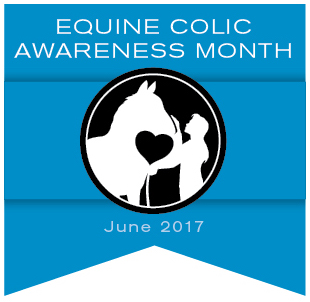 Author: Geoff Tucker, DVM, The Equine Practice
Author: Geoff Tucker, DVM, The Equine Practice
Colics could be avoided in my opinion if we treated horses like horses. Unfortunately it is almost impossible to do this today. With horses housed behind fences in small paddocks and overcrowded in large barns, the ideal environment is sacrificed for our convenience.
Let’s look at only one aspect of this confinement that directly affects the horse and his ability to maintain a healthy gastrointestinal tract. The principles here will help you in creating a better environment for your horses in all aspects.
How often do you deworm yourself? Have you dewormed your children recently? What brand did your parents use on you?
Whenever I ask these questions I see the funniest faces made. “What are you crazy Doc?” After determining that no deworming has ever occurred in their family, I then ask them why. If ivermectin and other chemicals are approved for use in humans, then why haven’t they used them?
Right now I start humming the theme from Jeopardy!
The answer is simple. You eat at a table in the dining room and defecate into a septic system. Knives and forks are parasite control. So are washing hands with soap and using toilet paper. The object of all of these is to keep your feces away from your mouth. Sanitation is the word used to describe this.
So how is the sanitation on your farm? Density of horses is the first factor followed by the frequency of manure removal and where the hay is placed. If the horses are eating on the ground where they are defecating, then you will need to add chemicals to reduce the number of larvae entering the horse’s mouth.
Correlation Between Parasites and Colic in Horses
In my mind, the load of parasites your horse needs to contend with in it’s body is directly correlated with the number of colics experienced on the farm. There are some horses that are tougher than others so in a herd of 10 horses maybe only 2 will chronically colic while 7 look unthrifty and occasionally colic and 1 appears normal. The way the horse fights the infection is a mounting of the immune defense system. This requires a lot of energy so even in the face of an adequate feed supply, the horse does not have a net amount of energy to survive. The results are weight loss, a dull hair coat, lethargy, skin disease (rain rot, scratches), and disease (most commonly colic).
I tested horses using a fecal float on two memorable farms in NY where colic was a common event. They both had about a dozen horses on 5 acres without any clean areas to graze. One farm had dewormed every 6 to 8 weeks using the best chemicals. The other refused to “poison” their horses with chemicals so the owner used diatomaceous earth which physically damages the larvae inside the horse. However, sanitation was not practiced on either farm and both farms were unfit for creatures to live. No matter what strategy they used, the horses were overwhelmed with infection.
The fecal exams resulted in 2000 eggs per gram of feces. For those of you not into the metric system allow me to convert this. With 454 grams in a pound, the conversion yields almost 1 million parasite eggs per pound of poop.
Sanitation to Avoid Equine Colic
Where sanitation is practiced colic is usually not an issue. Farms that do not over crowd or where they remove the manure piles from the paddock as well as the stall usually do not have colic episodes. In addition they have a radiant look of health and consume less feed because less energy is required to exist.
If we could allow horses to be horses most of our management would be unnecessary. They are supposed to eat here, defecate there, and be in the next town next week. So my best suggestion to avoid colic on your farm is to practice sanitation with manure removal, reducing herd size, and, as a last resort, increase your frequency of deworming to monthly and even daily.
De-worming to Avoid Equine Colic
Here is a tip to start your deworming strategy. Administer ivermectin at least equal to the weight of the horse (do not under dose but slightly over dosing is safe). Then take a picture of your horse and mark on your barn calendar this day. In 7 days deworm again with ivermectin and mark this on your calendar. Then once more in another 7 days deworm again with ivermectin. Compare your horse to the picture you took 3 weeks earlier. If you like what you see, then schedule monthly deworming or start with the daily dewormers. I know that the current advice is to do a fecal and only deworm if there is a problem. Maybe you can do this after you have the infection under control and you have changed your management to improve sanitation. But if you have a colic problem on your farm you need to do something to help the horses. Back in the late 70’s before we had all these sophisticated chemicals available, vets would treat chronic colic horses with DEC (diethylcarbamizine) which once was the daily heartworm prevention for dogs. It was the first daily use of dewormer and worked well. It was evidence to me then that parasites were directly associated to colic.
Blog Of Your Horse’s Advocate™ by Geoff Tucker, DVM is licensed under a Creative Commons Attribution-NoDerivs 3.0 Unported License.
The information contained in the blog or web site here is for information only and is the opinion of Geoff Tucker, DVM. It is not intended to replace your relationship with your veterinarian nor is it to be considered an attempt to diagnose or treat your animal. You need to discuss any and all medical conditions with your veterinarian who has established a relationship with you and your horse.








Conditions that irritate, clog, or inflame your skin can cause symptoms such as redness, swelling, burning, and itching. Allergies, irritants, your genetic makeup, and certain diseases and immune system problems can cause dermatitis, hives, and other skin conditions. Many skin problems, such as acne, also affect your appearance. Your skin can also develop several kinds of cancers.*”‘:
Head to our own web page too
<http://www.healthwellnessbook.com/